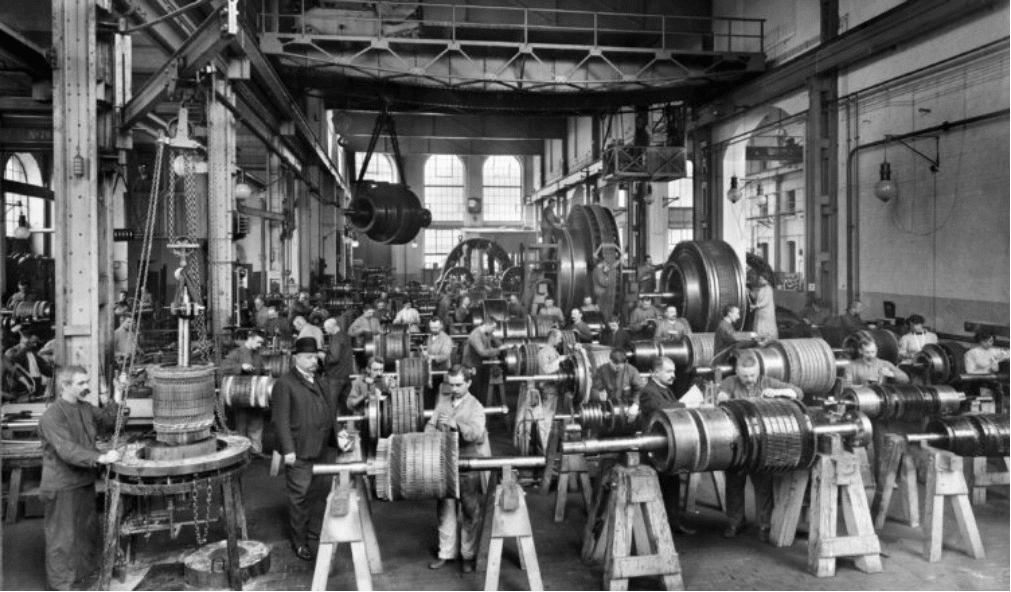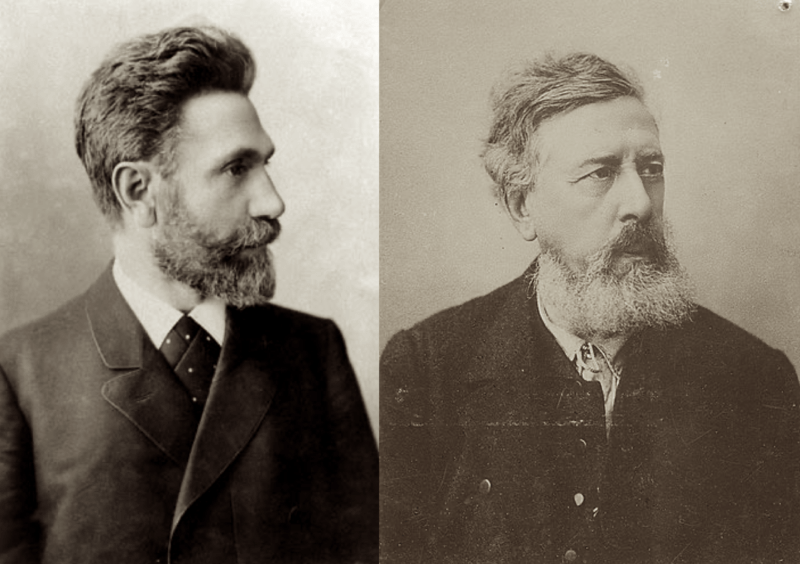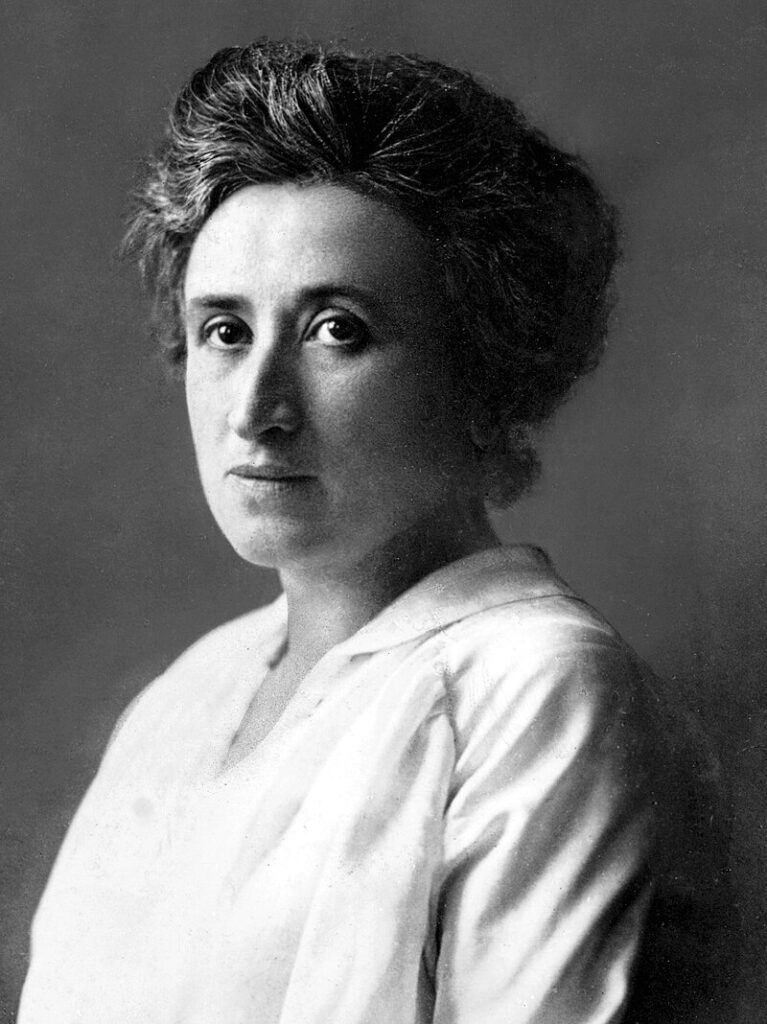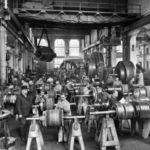 The German Revolution of 1917-1919, Part 1: German Social Democracy before 1914
The German Revolution of 1917-1919, Part 1: German Social Democracy before 1914By Greg Oxley, editor of the French Marxist website La Riposte
In this seven-part article, first published on the La Riposte website in February 2021, Greg Oxley looks in depth at this tumultuous period and draws out some key lessons for the workers’ movement today. Part 1 looks at the history of the workers’ movement and the position reached by the German Social Democrats prior to the outbreak of the world war.
**************
The German Revolution of 1917-1919 was, like the Soviet Revolution in Russia, a direct consequence of World War I. The carnage on the fronts and the economic and social consequences of the war placed millions of German workers and soldiers in a situation where they had no alternative but to rise up against the existing social order, attempt to seize power, and try to reorganise society on a new foundation.
The events of 1917-1919 would prove to be only the first part of a revolutionary process that underwent a second ascendant phase – and, unfortunately, a new failure – in 1923. The defeat of the revolution had such important historical consequences that it would largely determine the general course of European history for several decades to come.
Firstly, it prepared the ground for the emergence of a fascist mass movement, supported by the German capitalist class and under the leadership of Adolf Hitler. Hitler would eventually take power in January 1933. Secondly, it dashed the hopes of the leaders of the Russian Revolution in the international extension of the revolution, without which Soviet democracy could not possibly survive.
The importance of studying the German revolution
Of all the events of the German revolution, it is mainly the assassination of Rosa Luxemburg and Karl Liebknecht that has remained embedded in the collective consciousness of militants of our own time. And yet few militants in Germany, let alone in Britain or elsewhere, take the time to study the course of the revolution as a whole, and the causes of its tragic outcome. Revolutions, and especially those that are defeated, tend to end up becoming part of the “folklore” of the workers’ movement, and are often referred to in lyrical, sentimental and somewhat fatalistic terms. At commemorative ceremonies, we mourn “martyrs” and the disappointed hopes, but little attention is paid to the root causes and internal logic of events, or to the lessons of defeats.
Rosa Luxemburg and Karl Liebknecht are among the greatest representatives of socialism and internationalism. Cowardly massacred by their enemies, they paid the highest price for their revolutionary commitment. But their terrible fate was part of a much larger tragedy. We can place red roses on their graves, display their portraits, praise their spirit of revolutionary self-sacrifice. But surely the best way to pay tribute to them would be to seek a better understanding of their ideas and their struggle, as well as of the circumstances that thwarted the revolution in which they played such an important role.
After the defeat of the revolutionary insurrection of 1848, the monarchical regime of the German Empire adapted to the needs of the bourgeoisie. The state and the government apparatus were in the hands of the Prussian aristocracy, who pledged allegiance not to parliament but to the emperor. Prussia covered more than half of the territory of the Empire, in which many states, principalities and “free” cities were united in a single Reich under Prussian rule. The Reich Parliament could veto government laws, but the government itself was appointed by the emperor. Each local state had its own institutional structures and voting system, which usually worked to the benefit of the upper classes.
The building of the Social Democratic Party in a period of repression

The Social Democratic Party, formally banned until the 1890s and constantly harassed by the regime, grew up in this difficult context. Max Beer, for example, who was the publisher of a Social Democratic newspaper in Magdeburg for 22 years, spent 14 of those years in prison. Even after the legalisation of the party, Social Democratic leaders were regularly imprisoned or sentenced to forced labour under various pretexts. As late as 1910, a number of teachers were fired simply for publicly wishing Social Democratic leader August Bebel a happy birthday!
Despite the repression, the Social Democratic Party grew impressively. It evolved in a context of economic expansion which lasted until the outbreak of the 1914 war, and during which workers’ organisations managed to win important concessions, while wages increased, and general living standards improved. The working week was shortened and, in the hope of limiting the growth of workers’ organisations, especially in large industry, Bismarck even introduced a rudimentary system of social benefits.
At the time, “social democratic” meant “revolutionary” to most people. However, the long period of economic expansion and social reforms was bound to exert an influence on the behaviour and thinking of the social democratic leadership and membership. Their methods of struggle, their daily activity, and their way of thinking were shaped by the circumstances of the times. Born of the 1875 fusion of two political tendencies – those of the Marxists and of supporters of the reformist Ferdinand Lassalle – the Social Democratic Party as a whole embodied the aspirations of practically all the workers of the Empire. Lassalleans and Marxists alike faced a repressive state offering them virtually no opportunity to take part in decision-making processes and condemning them to a marginal political existence. This prompted Lassalle to seek a compromise – not to say collaboration – with the regime in the hope of obtaining further concessions.
“Revolutionary in theory” but not in practice
As for the Marxists, even if they stood formally for a revolutionary overthrow of the established order, they could see that the class enemy was far too powerful for this to be achieved in the foreseeable future. Thus, the usual characterisation of the pre-1914 Social Democratic Party as “revolutionary in theory, but reformist and gradualist in practice”. The Erfurt Programme (1891) affirmed the revolutionary nature of the party, adding that it has no illusions in bourgeois parliamentarism. If it is not possible to overthrow the state, the party could only strive to build as powerful a counter-power as possible, a kind of “state within the state”. Activity was essentially directed at organising the workers as massively as possible and defending their interests within the framework of the existing order.
For more than four decades, the history of the Empire presented the German workers’ movement with no opportunities for going onto the offensive against capitalism as a system. Thus, beyond the revolutionary aims enshrined in its texts, the daily practical activity of the party was about organising election campaigns, the publication of newspapers and leaflets, propaganda meetings and the building of local organisations. The concrete results of this “reformist” activity were very impressive. With one million members, hundreds of full-timers, 4.5 million voters (34% of the vote) and 13,000 local elected officials on the eve of the 1914 war, the party had 90 daily newspapers and oversaw a vast network of trade unions, associations, mutualists, cooperatives, cultural and sports organisations.
Reformist ideas gain ground in the party
As time passed, the disconnection between the revolutionary objectives set out in party theory and reformist practice became more obvious. The slide to more “moderate” or opportunistic positions was not simply imposed from above by corrupt officials. It was determined by the objective conditions of the time. Reformist pressures were particularly strong among elected officials and permanent officials, especially after the replacement of Bebel by Ebert as General Secretary of the party in 1906.

Source Wikimedia Commons.
Marxist principles remained valid in the minds of social democrats, but the practical priorities and ideological leanings of the party as a whole were being shaped by the social and economic environment. The most outstanding historian of German Social Democracy during this period, Carl Schorske, summed up the situation in these terms: “As long as the state relegated the working class to pariah status, and as long as the working class could appropriate a share of the benefits of a vigorous expanding capitalism and was not driven to revolt, the Erfurt synthesis could hold.” [German Social Democracy 1905-1917].
From 1897 onwards, one of the party’s theorists, Edward Bernstein, distanced himself from the ideas of Marxism and advocated a revision of the party’s programme and aims. He is supported in this by many party officials. Bernstein rejected the goal of a revolutionary overthrow of capitalist society. In a series of writings, including The Preconditions of Socialism (1897), he defended the perspective of a “socialism” that would gradually and peacefully weave its way into society. He saw socialism as a perpetual movement, gradually establishing itself by means of a succession of social and institutional reforms. Socialism was not to be seen as the product of an uprising of the workers, but as the result of gradual changes in the capitalist state. “The goal,” he said, “whatever it may be, means nothing to me, the movement is everything.”
This is how his approach has been called “evolutionary socialism”, leading to a gradual overcoming of capitalism, avoiding the need for a revolution. Bernstein’s ideas, strongly opposed by party leaders such as Karl Kautsky, August Bebel and Rosa Luxemburg, as well as by Russian Social Democrats such as George Plekhanov and Vladimir Lenin, failed to win a majority in the party.
Rosa Luxemburg defends revolutionary aims and ideas

Source Wikimedia Commons.
On the left of the party, the Polish exile Rosa Luxemburg opposed what she saw as an adaptation of the party to the institutions of the bourgeois state. The preoccupation with building the party apparatus, with election campaigns and reformist propaganda, tended to push the organisation of concrete struggles aside, and relegate revolutionary aims to occasional mentions in official speeches. In close contact with the leaders of the party, she sensed a lack of revolutionary seriousness in them. Bureaucratic complacency saw no further than the maintenance of the apparatus and the defence of past gains.
Rosa Luxemburg defended her revolutionary ideas and formulated her criticism of the behaviour of the leaders in numerous articles and interventions at party meetings. Impressed and inspired by the insurrectionary strikes in Russia in 1905, she advocated a propaganda campaign for a “mass strike” in Germany, which drew a hostile reaction from many of the leaders. However, the overall impact of Rosa Luxemburg’s ideas was only marginal. Most active members were absorbed in the routine activities encouraged by the officials – what else could they do? – and saw Rosa Luxemburg’s ideas as “abstract”, “theoretical”, and essentially devoid of practical significance.
Rosa Luxemburg’s correspondence at this time indicates that she felt isolated and helpless. She didn’t think she could convince the party’s base. She thought that only a massive movement of the working class would change the balance of forces between revolutionaries and the representatives of the “centre” that led the party. In a letter to her friend and comrade Clara Zetkin in 1907, she wrote: “I feel more than ever the childishness and hesitation of the regime in the party. However, I cannot worry as much as you do, because I see with depressing clarity that neither things nor people can change without a change in the whole situation – and, even then, we will face the inevitable resistance of these people if we want to lead the masses forward. Our task will take years.”
Luxemburg argues for staying within the party
Faced with this distressing observation, some of her closest associates proposed leaving the social democratic movement and forming a new organisation. But Rosa Luxemburg was firmly opposed to this. The creation of a revolutionary “sect” did not at all interest her. Given a mass movement, she believed, it would be possible to transform the party and give it a clearly revolutionary orientation. Leaving the party would solve nothing and would only condemn the revolutionaries to impotence.
Rosa Luxemburg acted more or less in isolation, at the time. There was no organised structure bringing her supporters together. At most, her tendency amounted to an informal network of militants on the left of the party, but they did not feel bound by any common discipline. This rather fragile left wing of the party nevertheless experienced a certain development from 1910 onwards, under the impact of strike movements and attacks directed against it by the party leadership. Towards the end of 1913, Rosa Luxemburg launched a weekly magazine to defend her ideas, without, however, trying to organise militants around the publication.
Part 2 will look at the outbreak of the war, the impact of the war on the working masses, and the anti-capitalist stance of Karl Liebknecht and Rosa Luxemburg.
 The German Revolution of 1917-1919, Part 1: German Social Democracy before 1914 - By Greg Oxley, editor of the French Marxist website La Riposte In this seven-part article, first published on the La Riposte website in February 2021,
The German Revolution of 1917-1919, Part 1: German Social Democracy before 1914 - By Greg Oxley, editor of the French Marxist website La Riposte In this seven-part article, first published on the La Riposte website in February 2021, From welfare to warfare: military Keynesianism - By Michael Roberts Warmongering has reached fever pitch in Europe. It all started with the US under Trump deciding that paying for the military ‘protection’
From welfare to warfare: military Keynesianism - By Michael Roberts Warmongering has reached fever pitch in Europe. It all started with the US under Trump deciding that paying for the military ‘protection’ Thinking Systematics - By Michael Roberts Canadian Marxist sociologists Murray EG Smith and Tim Hayslip have written a profound and wide-ranging book that aims to elaborate and popularize
Thinking Systematics - By Michael Roberts Canadian Marxist sociologists Murray EG Smith and Tim Hayslip have written a profound and wide-ranging book that aims to elaborate and popularize Ukraine war: is it a proxy war, and was Russia provoked? - By John Pickard There are differences of opinion on the left of the British labour movement on the attitude that socialists should adopt towards the
Ukraine war: is it a proxy war, and was Russia provoked? - By John Pickard There are differences of opinion on the left of the British labour movement on the attitude that socialists should adopt towards the The Russian Revolution of 1905 - This months marks 120 years since the outbreak of revolution in Tsarist Russia. It actually began on January 9 1905, but, as this article shows,
The Russian Revolution of 1905 - This months marks 120 years since the outbreak of revolution in Tsarist Russia. It actually began on January 9 1905, but, as this article shows,

